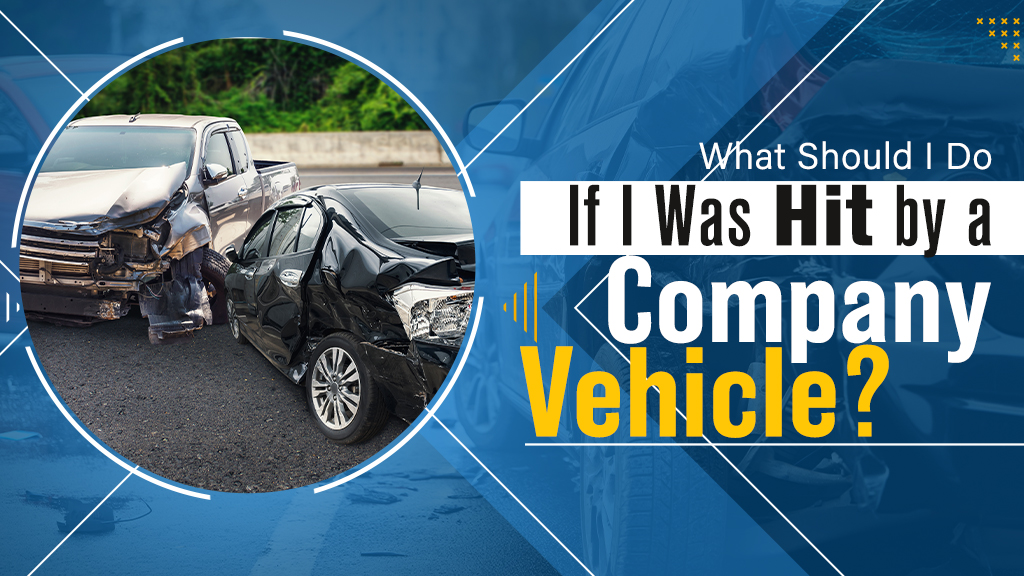Accidents bring injuries, tension, and financial stress — and if you’re hit by a company vehicle, the situation gets even more complex. Understanding your rights and the correct steps to take can make a huge difference in protecting your health, your finances, and your legal claim.
This guide explains what happens after a company car accident, who may be responsible, how to deal with insurers, and when to involve an attorney.
What Is a Company Vehicle?
A company vehicle is any automobile owned, leased, or operated by a business for work purposes. They’re used by employees or agents to transport goods, passengers, or equipment. Because they’re constantly on the road, accidents are more likely — especially if drivers are rushing to meet deadlines or are fatigued.
Common examples:
-
Moving trucks and cargo vans
-
Delivery vehicles (Amazon, FedEx, UPS, USPS)
-
Corporate cars or sales fleet vehicles
-
Service vans (plumbing, electrical, HVAC)
-
Rideshare vehicles (Uber, Lyft) when the driver is “on app”
-
Government vehicles or public-works trucks
Need Award-Winning Representation?
Our experts are ready to help you claim the compensation you deserve.
Understanding Liability in a Company Vehicle Accident
In California, the at-fault party (or parties) must pay for your losses. When the crash involves a commercial vehicle, several layers of responsibility may exist:
Employer Liability (Vicarious Liability)
If the driver was acting within the scope of employment, the employer is typically responsible for damages. Examples include:
-
Making deliveries
-
Traveling to job sites
-
Transporting clients or equipment
Driver Liability
The employee may be personally liable if they:
-
Used the vehicle for personal errands (“frolic”)
-
Drove under the influence
-
Acted with reckless disregard for safety
Third-Party Liability
Other entities may share blame:
-
Vehicle manufacturers (defective brakes/tires)
-
Mechanics or fleet maintenance contractors
-
Municipalities that failed to fix dangerous road conditions
-
Another negligent driver
Because there may be multiple insurance policies (commercial, personal auto, umbrella coverage), determining fault and coverage can be complicated.
Common Causes of Company Vehicle Accidents
While company drivers face the same hazards as anyone else, job pressures and long hours raise risk:
-
Distracted driving (texting, GPS, delivery scanners)
-
Fatigue from long shifts or tight delivery windows
-
Speeding or aggressive lane changes
-
Tailgating or following too closely
-
Poor weather or road design
-
Improperly loaded cargo
-
Mechanical failure or inadequate fleet maintenance
Steps to Take Immediately After Being Hit by a Company Vehicle
-
Prioritize Safety & Medical Care
-
Call 911 if anyone is injured.
-
Even minor aches can signal serious trauma — see a doctor promptly.
-
-
Contact the Police
-
Obtain an official report for insurance and legal purposes.
-
-
Gather Critical Information
-
Driver’s name, employer, license, insurance card
-
Vehicle details (make, model, plate, DOT number for trucks)
-
Employer contact info or supervisor name
-
-
Document the Scene
-
Take wide and close-up photos of vehicles, damage, skid marks, traffic signals, and road hazards.
-
Record witness statements and contact details.
-
-
Notify Your Insurance
-
Report the crash but avoid admitting fault or giving a recorded statement before legal advice.
-
-
Consult an Experienced Orange County Car Accident Lawyer
-
A car accident lawyer can investigate liability, obtain company records (maintenance logs, driver schedules), and negotiate with insurers.
-
What Compensation Can You Recover?
Victims of company vehicle accidents may be entitled to both economic and non-economic damages:
-
Medical expenses: ER visits, surgery, physical therapy, prescriptions
-
Lost wages & future earning capacity
-
Vehicle repair or replacement
-
Pain and suffering / emotional distress
-
Loss of consortium or quality of life
-
Punitive damages (rare — for egregious misconduct such as drunk driving)
Commercial policies often have higher limits than personal auto policies, so serious injury claims can be substantial.
How Insurance Claims Work After a Company Car Crash
-
Commercial Auto Insurance: Most businesses carry policies with larger limits and sometimes multiple layers of coverage.
-
Employer Self-Insurance: Some corporations self-insure or use high-deductible retention plans.
-
Personal Auto Coverage: If the driver used a personal vehicle for work, both their policy and the employer’s may apply.
-
Workers’ Compensation: If you were driving for work when hit, you might also have a workers’ comp claim.
Because insurers may argue over who pays, having legal representation is vital.
How Long Do You Have to File a Claim?
In California, the statute of limitations for personal injury is two years from the accident date. For claims against government vehicles (city trucks, public buses), a special administrative claim usually must be filed within 6 months. Missing these deadlines can bar recovery entirely.
Why Hire an Attorney for a Company Vehicle Accident?
-
Identifies every liable party and source of compensation
-
Preserves evidence: dash-cam footage, vehicle logs, driver employment files
-
Handles negotiations with aggressive commercial insurers
-
Calculates future losses (ongoing medical care, loss of earnings)
-
Prepares for litigation if settlement isn’t fair
Most personal injury lawyers work on a contingency fee, so you pay nothing unless they recover compensation.
Also Read: What Does A Slip And Fall Lawyer Do?

